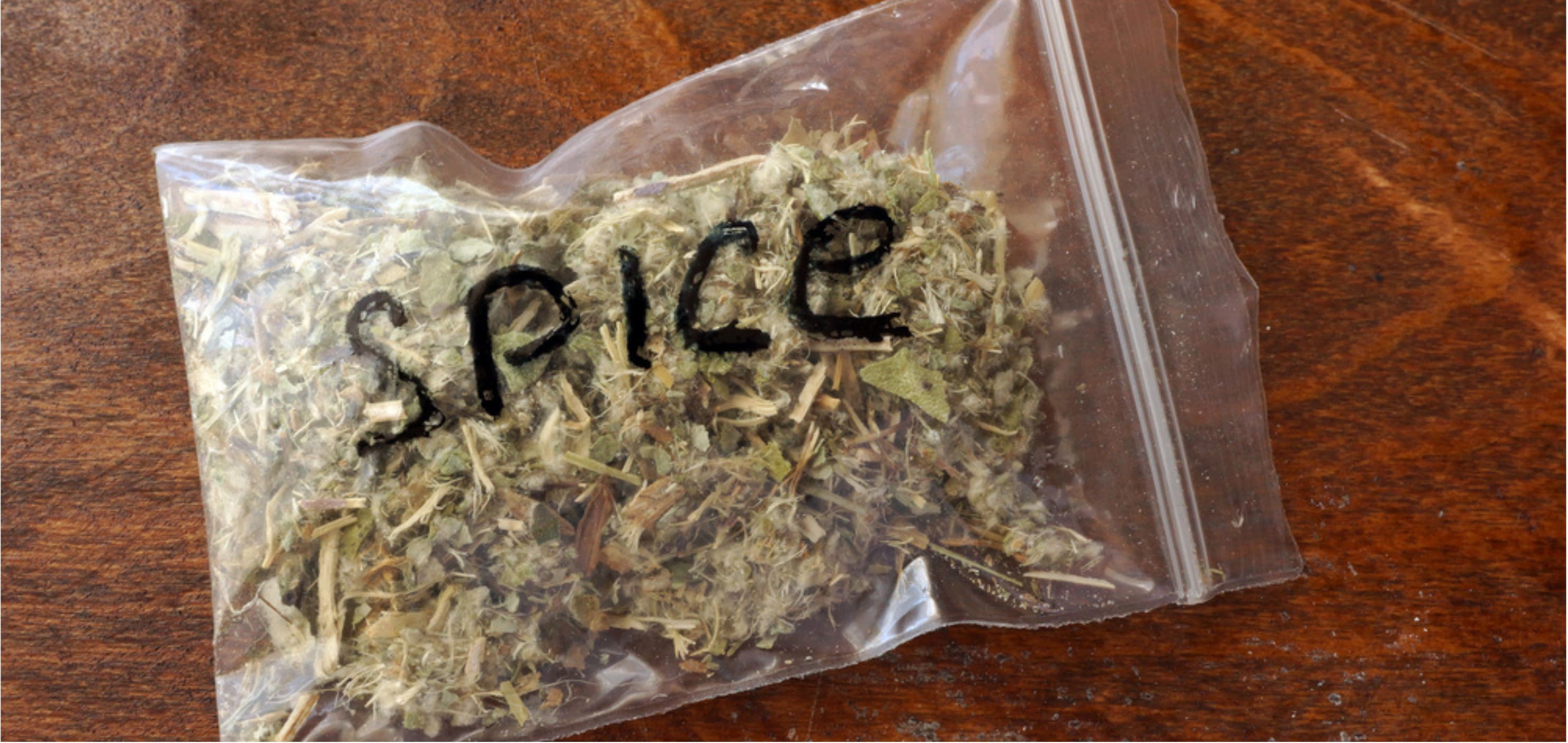
Written by:

Medically Reviewed by:
Last Updated:
February 14th, 2025
Spice Addiction
What is Spice?
Spice is a synthetic drug designed to mimic the effects of cannabis. Originally sold legally in the UK as a ‘legal high’, it became popular due to its perceived safety and accessibility. However, its effects are far from harmless. Spice is a type of synthetic cannabinoid made from chemical compounds that bind to the same receptors in the brain as cannabis, but often with much stronger and unpredictable effects.
Since its rise in popularity, the UK government has banned Spice, making it illegal to produce, sell or possess. Despite this, its presence persists, often causing severe physical and mental health issues for users. Understanding what Spice is helps build awareness of its dangers and the need for proper support if dependency develops.
Is Spice addictive?
Yes, Spice can be highly addictive. Many people mistakenly assume it’s less harmful because of its past as a legal alternative to cannabis. However, Spice often leads to dependency, with withdrawal symptoms that can be both severe and distressing. Its unpredictable effects stem from constantly changing chemical formulas, making each batch potentially more dangerous than the last.
Withdrawal symptoms from Spice can include anxiety, insomnia, intense cravings, paranoia and even hallucinations. These symptoms can feel overwhelming, especially when someone tries to quit alone. Recognising the addictive nature of Spice is essential in understanding why seeking professional help is often the safest and most effective path toward recovery.
Spice in the UK
Spice has caused a ripple of destruction across the UK, touching some of the most vulnerable parts of society. Its impact is far-reaching, from the prison system to the streets and now, shockingly, to schoolyards.
Spice in UK prisons
The scale of Spice use in UK prisons is staggering. Between 2015 and 2020, it was linked to 62 of 129 non-natural deaths in English and Welsh prisons, accounting for nearly half of all such cases. The drug’s cheap availability and intense effects make it a grim fixture behind bars, causing not only fatalities but also severe health issues for inmates. Its presence in these facilities has turned a tough environment into something even more dangerous, leaving prison staff and healthcare workers struggling to keep up with its devastating effects.
Spice and homelessness
Spice is also devastating among the UK’s homeless population. People trapped in a cycle of dependency, their health deteriorating and their chances of recovery slipping further away with each hit. Its low cost and extreme potency have made it an easy choice for those with nothing left to lose but its toll is undeniable, robbing them of their health and hope.
Spice in schools
Spice isn’t just an issue for adults either, as it’s become a growing concern for children, too. In 2024, several schoolchildren in Eltham, south-east London, were hospitalised after inhaling fake vape pens laced with Spice. One child was left in a coma. This isn’t an isolated incident, either. Testing on confiscated vapes across 38 schools in England found that one in six contained Spice. It’s a terrifying statistic that shows just how far this problem has spread, putting young lives at risk in a place where they should feel safe.
What are the signs of Spice addiction?
It’s crucial to recognise the signs of Spice addiction, whether in yourself or a loved one. Early detection can make all the difference in getting the right support. These signs can manifest in physical, psychological and behavioural ways, often overlapping to form a clear picture of dependency.
Physical signs:
- Fatigue: Persistent tiredness or lack of energy due to disrupted sleep patterns.
- Bloodshot eyes: Red, irritated eyes caused by frequent Spice use or lack of rest.
- Rapid weight loss: Unintentional and significant weight changes due to appetite suppression.
- Poor hygiene: Neglecting personal cleanliness or appearance in favour of using Spice.
- Tremors and sweating: Experiencing body shakes and excessive sweating, particularly during Spice withdrawal.
- Breathing issues: Difficulty breathing or coughing due to smoking the drug.
Psychological signs:
- Irritability: Increased frustration or agitation when unable to access Spice.
- Memory problems: Struggling to remember recent events or maintain focus.
- Mood swings: Sudden emotional changes, from euphoria to aggression or depression.
- Paranoia: Feelings of being watched or persecuted after taking Spice.
- Anxiety and depression: Heightened stress levels and persistent low mood.
- Hallucinations: Seeing or hearing things that aren’t there after taking Spice.
Behavioural signs:
- Financial struggles: Spending excessive amounts of money on Spice or related paraphernalia.
- Social withdrawal: Isolating from family and friends.
- Neglecting responsibilities: Failing to meet work, school or personal commitments.
- Risk-taking behaviours: Engaging in dangerous activities while under the influence.
- Secretive behaviour: Hiding usage or lying about where they’ve been or what they’ve done.
Where can I get help for Spice addiction?
Finding yourself struggling with a Spice addiction can be overwhelming. What may have started as simple experimentation or a way to escape life’s difficulties can spiral into something much more serious. If you’re in this place, remember that you are not alone. Help is available through Liberty House, where compassionate, expert support is just a step away.
Our treatment programme is designed to help you regain control of your life. Here’s a brief overview of how we approach recovery:
- Detox: The first step involves safely removing Spice from the body in a supportive environment. Our medical team is constantly available to manage withdrawal symptoms, ensuring the process is as comfortable as possible.
- Therapy: Recovery goes beyond physical detox. We offer tailored therapies such as Cognitive Behavioural Therapy (CBT), Dialectical Behavioural Therapy (DBT) and one-on-one counselling. These therapies help uncover and address the emotional and psychological roots of addiction.
- Aftercare: Maintaining sobriety after rehab is crucial. Our aftercare programme provides continued support through therapy sessions, recovery plans and access to helpful resources to prevent relapse and encourage long-term success.
If you’re ready to take the next step, we’re here to walk that journey with you.
Take the first step today
If you or someone close to you is struggling with Spice addiction, don’t wait until things worsen. Liberty House offers compassionate, professional care to help you regain control and build a brighter future. Our expert team is here to guide you through recovery every step of the way. Contact us today and start your journey toward lasting freedom from addiction.
Frequently Asked Questions
(Click here to see works cited)
- University, Middlesex. “Worrying Increase in Spice Jail Deaths Highlights ‘Crisis in Prison System.’” Middlesex – London, 31 Jan. 2023, www.mdx.ac.uk/news/2023/1/spice-prison-deaths/.
- “VICE: The Hard Lives of Britain’s Synthetic Marijuana Addicts.” YouTube, YouTube, 25 July 2015, www.youtube.com/watch?v=t6pmc7Tpx4w&ab_channel=VICE.
- “Children Hospitalised by Spice-Laced Vape with One Left in a Coma.” The Independent, Independent Digital News and Media, 13 Feb. 2024, www.independent.co.uk/news/uk/home-news/spice-vape-eltham-south-east-london-b2494863.html.
- Media, Clara Bullock & PA. “Pupils Unwittingly Smoking Spiked Vapes University of Bath Study Finds.” BBC News, BBC, 25 July 2024, www.bbc.co.uk/news/articles/c897qw8ddp9o.






